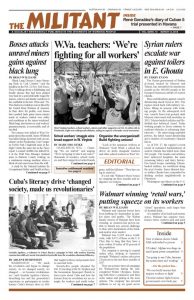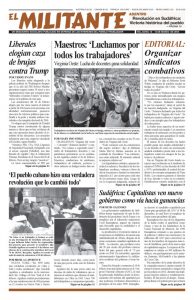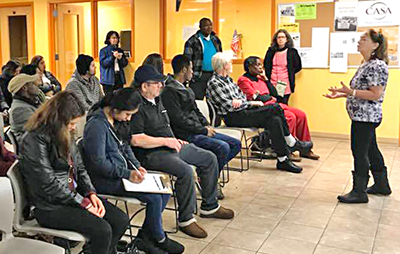WASHINGTON — “We made the revolution and began to change society. As we changed society, we changed — we became revolutionaries,” said Griselda Aguilera Cabrera, describing her and her generation’s experience as participants in revolutionary Cuba’s literacy drive in 1961 that taught workers and peasants how to read and write.
Seventy-five people attended the Feb. 16 meeting at the St. Stephen and the Incarnation Episcopal Church to learn more about Cuba and how the lessons from its revolution are an example for workers and youth today. It was sponsored by the D.C. Metro Coalition in Solidarity with the Cuban Revolution and endorsed by more than a dozen area groups.
Catherine Murphy, director of the documentary “Maestra” (teacher) — about the 1961 literacy drive — showed the film at the meeting. Murphy helped organize the D.C. leg of the tour. The documentary describes how a quarter of a million volunteers worked with more than 700,000 fellow Cubans, wiping out illiteracy in less than a year. Some 100,000 of these volunteers were under 18, the majority female. At age 7, Aguilera was the youngest volunteer.
“In the coming year, our country intends to wage its great battle against illiteracy, with the ambitious goal of teaching every single illiterate person in the country to read and write,” Fidel Castro told the U.N. General Assembly in September 1960.
“That’s exactly what we did. This immeasurable project, one of the first campaigns of the revolution, succeeded because it was a movement,” Aguilera said. “It was planned, organized. Teacher’s Day, Dec. 22, is celebrated in Cuba.”
“We challenged the past. In towns where the custom was to have blacks on one side, and whites on the other, where no one asked why, people began to work together,” she said. “Women began to feel a sense of freedom for the first time in their lives. It was a rupture from that archaic way of raising young women. It was a revolution inside the revolution.”
“What can you tell me about why Cuba nationalized industries?” asked Nubia Kai, a leader of the D.C. Metro Coalition.
“The revolutionary government put the electrical companies, the telephone company, the nickel mines, the hospitals, the private schools, into the hands of the people and the nation to run them,” Aguilera answered.
“But I want to give you an accurate picture. Cuba is not perfect,” she said. “The young generation lives in a different world today. We are too poor to have many ‘things,’ but those things that we hear about from tourists and the internet pull on young people.
“We explain the history of our struggle. We explain where the respect for our revolution around the world comes from,” she said. “They don’t come from things, but from struggles and sacrifices.”
Jennifer Ubiera, a participant in last fall’s “In the Footsteps of Che” International Brigade to Cuba, urged those at the meeting to sign up for the May Day Brigade. The meeting ended with greetings from Miguel Fraga, first secretary of the Cuban Embassy.
Aguilera spoke to 60 workers and staff members Feb. 14 at Casa de Maryland’s Prince George’s Workers Center in Hyattsville, Maryland. Participants included immigrants from Africa and Latin America. The meeting, conducted in Spanish, was translated into both French and English. After the gathering she toured the center, which trains workers in construction trades and safety. Aguilera worked advancing education and safety for construction workers in Cuba.
“Since the compañera’s visit, many students have asked me, did you hear the part where Griselda said that illiteracy was stamped out in a year, not hundreds of years?” Lindolfo Carballo, a former construction worker and director of Casa’s Community Economic Development Department, told the Militant. “Imperialism will never succeed in teaching people to read.”
Aguilera spent the next day in Richmond, Virginia, where she spoke to some 250 students at Huguenot High School. The African Awareness Association hosted a citywide meeting of 45 that evening at the Wesley Memorial United Methodist Church. She also spoke to students at the Nyumburu Cultural Center at the University of Maryland.


